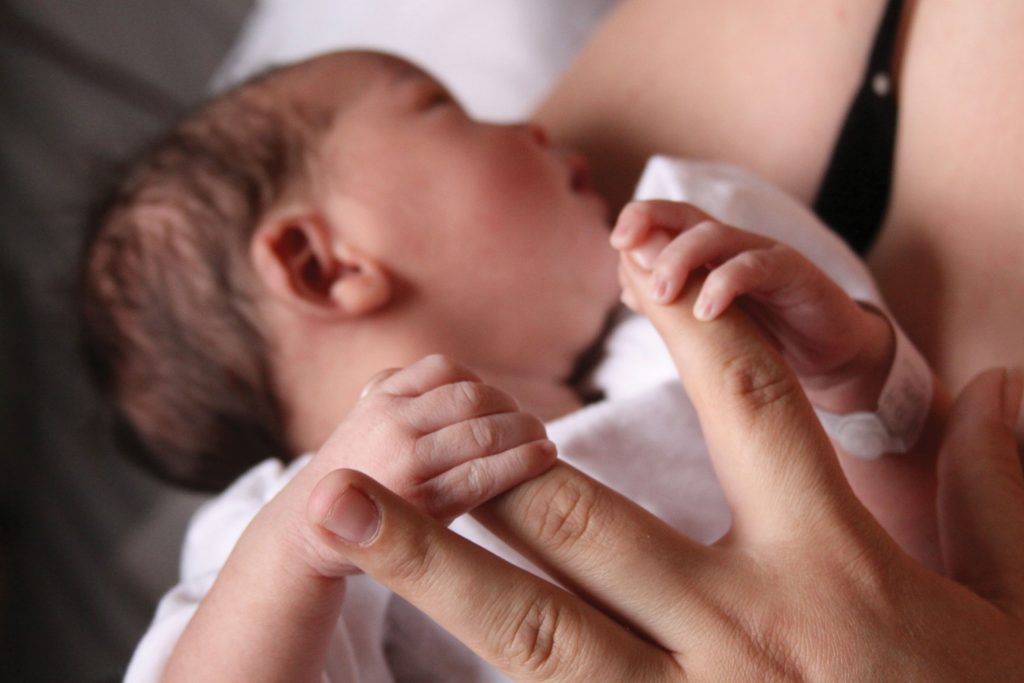By Jennifer Greer
It is a particular irony that the single most important event in our lives – birth – is one we remember nothing about. But our mothers remember, says Dalia Abrams, a Birmingham entrepreneur, non-profit leader, childbirth/women’s health advocate, and mother of four adult children.
“It was so empowering. That birth experience left me feeling like I could do anything in the world,” Abrams recalls, a sense of awe still in her voice.
She makes the point because one of her children’s births completely changed the way she saw herself in life. But sadly, not everyone gets that opportunity.
“Later, I accompanied a childhood friend when she gave birth to her first baby. Her experience was just the opposite of mine, it was diminishing. It left her feeling like she was helpless and needed to be rescued. I realized then that the birth process can empower women to grow in a profound way, or it can diminish them. And I thought: ‘What would the world look like if every woman who has a baby thinks she can do great things?’”
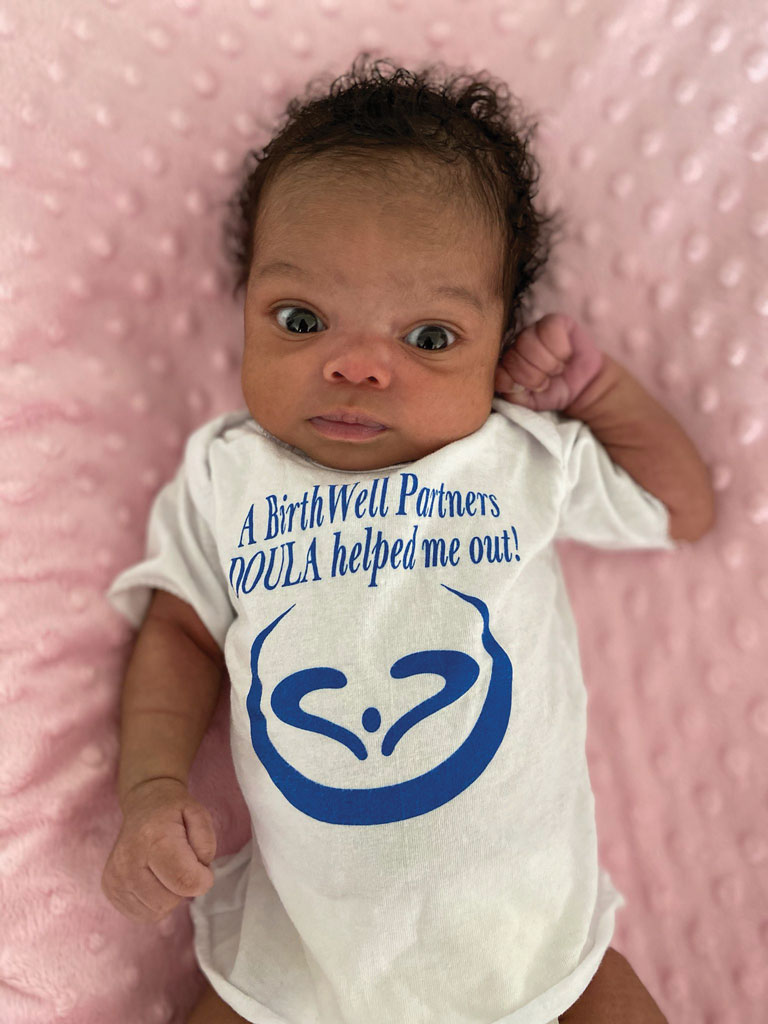
That question drove Abrams, of Forest Park, into health education, research and activism. Today, she holds an M.A. and M.P.H., and is co-founder and Executive Director of Program Operations at BirthWell Partners Community Doula Project (BWP), a Birmingham-based non-profit that is unique in the state.
“A doula is a trained, non-medical, pregnancy and birth support professional,” explains Abrams, who is a DONA Certified Birth Doula CD (DONA), a DONA Approved Birth Doula Trainer BDT(DONA), Lamaze Certified Childbirth Educator (LCCE), and a Certified Lactation Counselor (CLC). Convinced that doulas were part of the answer to her “what if” question, she teamed up with fellow birth activist, Susan Petrus, of Hoover, in 2011 to found BirthWell and re-imagine birth in Birmingham.
When they started out, “nobody knew what a doula was,” or what kind of non-medical, birth support was possible says Petrus, who is a mother of two, has an M.A., and is the Executive Director of Business Operations. This was true in part because doulas were perceived as “luxury” healthcare service and rare in the state.
Strategically, BirthWell set out to train doulas – creating a work-study program for applicants who could not afford the workshops – to serve pregnant women who could not afford to hire this potentially life-saving form of support. Over the past decade, BirthWell-trained doulas have attended more than 500 births and worked in every hospital in the Birmingham area. The organization has also had doulas attend births in Anniston, Tuscaloosa, and Huntsville, as its model of care branches outside the Birmingham metro area.
In the process, BWP doulas have helped achieve significantly better outcomes for under-resourced moms and babies who are at higher risk for infant and maternal mortality in Alabama (Alabama ranks poorly on both indices on a national level). Data in general show that doulas improve both maternal and infant health outcomes. Specifically, BirthWell’s outcomes data show their clients are:
• Less likely to give birth by Cesarean section (26% vs. Alabama rate of 34%);
• Less likely to get an epidural during labor (54% vs. Jefferson County rate of 89%);
• More likely to initiate breastfeeding (94% vs. Jefferson County rate of 76%).
(For more information, see 2019 research article co-authored by Ms. Abrams, “Improving birth and breastfeeding outcomes among low resource women in Alabama by including doulas in the interprofessional birth care team,” and yearly outcomes posted on the BirthWell web site www.birthwellpartners.org/outcomes-and-reports.)
Behind these numbers is an amazing group of young professionals, entrepreneurs, and community health activists who call themselves Birmingham doulas. You are about to meet three of them.
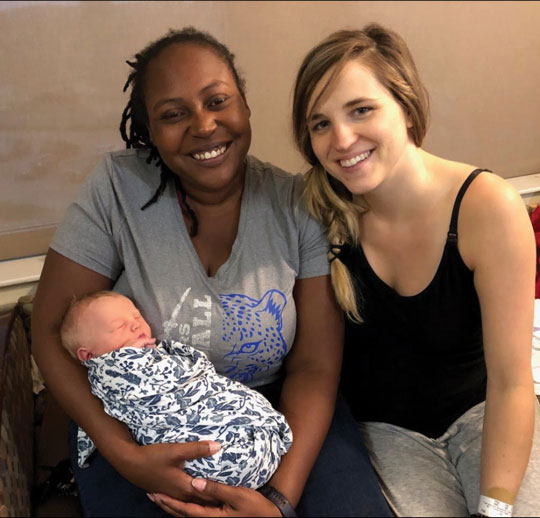
Leah J. Hayes: A Journey to Doulahood
Leah J. Hayes, of Birmingham’s Central City neighborhood, moved here from Michigan a decade ago after earning a bachelor’s degree in kinesiology, the study of movement. Today, she is a single mother of two and a BirthWell-trained doula who attends births in addition to her full-time job as an Office Associate at the University of Alabama at Birmingham (UAB). Her mission is personal as well as professional.
After struggling with infertility in her own life, Hayes had researched the birthing process extensively over the years. The desire to have a vaginal birth with her second pregnancy – after having a Cesarean section with her first child — and meeting resistance from her doctor, led her to take charge of the process.
“I switched doctors, called in a doula, and worked with her to get prepared… When I was scheduled for an induction, I texted her to come. My care changed completely as soon as she entered the room. It was like the sun coming out at night.”
The doula recommended specific positions to help her relax between contractions, once asked the nurses to reduce induction medications temporarily to give her time to rest, and then coached her through final contractions until she pushed out her baby boy. “My doula made all the difference, and I thought, “Wow, I want to be able to do that for other women.”
Hayes enjoys attending all client’s births, but she especially relates to women who are having a vaginal birth after a Cesarean section (VBAC). Prior to the pandemic, she helped a young client in this situation stay motivated during her hospital birth, working seamlessly with the rest of the team – a nurse midwife, a husband, sister, mother and two-year-old — in the room.
“She was the perfect candidate for a VBAC, but she had a lot of fear and anxiety. We played music, took turns giving her affirmations, telling her to dig down deep and push. She did, and pretty soon, she was holding that baby, saying, “I really did do it!”
“I usually cry at births,” adds Hayes, “but I cried a little more at that one.”
Rachel Casiday Bailey: A “bridge” to the best outcomes
BirthWell doulas are often mothers first who have enjoyed alternative birth experiences to what is common in Alabama – a clinical hospital birth overseen by an OB/GYN with limited other support prior to labor. Rachel Casiday Bailey, PhD, a professor of public health at Samford University, is a classic example.
“I lived and studied in the United Kingdom (UK), and I had all four of my children there before moving here in 2015,” she says. “The UK system is midwife-led. I really valued that model of care and having someone who is the same person involved in the whole pregnancy.”
Additionally, coming to public health from an anthropology background, Bailey wanted more hands-on training in healthcare delivery. When a colleague told her about BirthWell’s doula training program and outreach to under-resourced mothers, she decided to expand her skill set in an area that already interested her – women helping women have babies.
“Sometimes there is a perception that doulas have an agenda, or get in the way. But that is not the approach I take, or the one BirthWell takes. We see ourselves as empowering the clients to speak up,” she says. This may sound simple, but Bailey has been in situations where a birth client was expressing her wishes (for example, refusing an epidural), but was not being heard by the medical staff.
“In this case, both sides were speaking past each other. I was able to help my client clarify her goals. With breathing techniques, positive encouragement, and coaching, she relaxed and began to understand that what she was feeling was a normal level of discomfort. With a doula, she felt safer, and they did what is best for the mother and the baby. I was just being a bridge. Everyone wants the same outcomes.”
Doula-ing has been particularly difficult during the pandemic, but Bailey feels like she has still made a difference with clients. She recalls working in-person with one client from the five-month to eighth-month mark, then virtually – phone, text, Facetime, Zoom — as the COVID threat grew.
“Unfortunately, due to hospital restrictions about visitors during COVID, I was not able to be with her during labor, but she said she remembered everything I had taught her…When she really needed me was post-partum. Two weeks out, I visited the home and she was having a problem getting the baby to latch to breastfeed. I connected her with a lactation consultant, who worked with her virtually to get her and the baby back on track.”
Given the health risks to some moms and babies post-partum, Bailey is glad that doula-led, home intervention succeeded. “There are so many breastfeeding benefits, including immunity, with lots of antibodies that can’t be replicated in formula. From preventing allergies to aiding with digestion, breast milk promotes infant health. And then there is the bonding between the mother and the baby…”
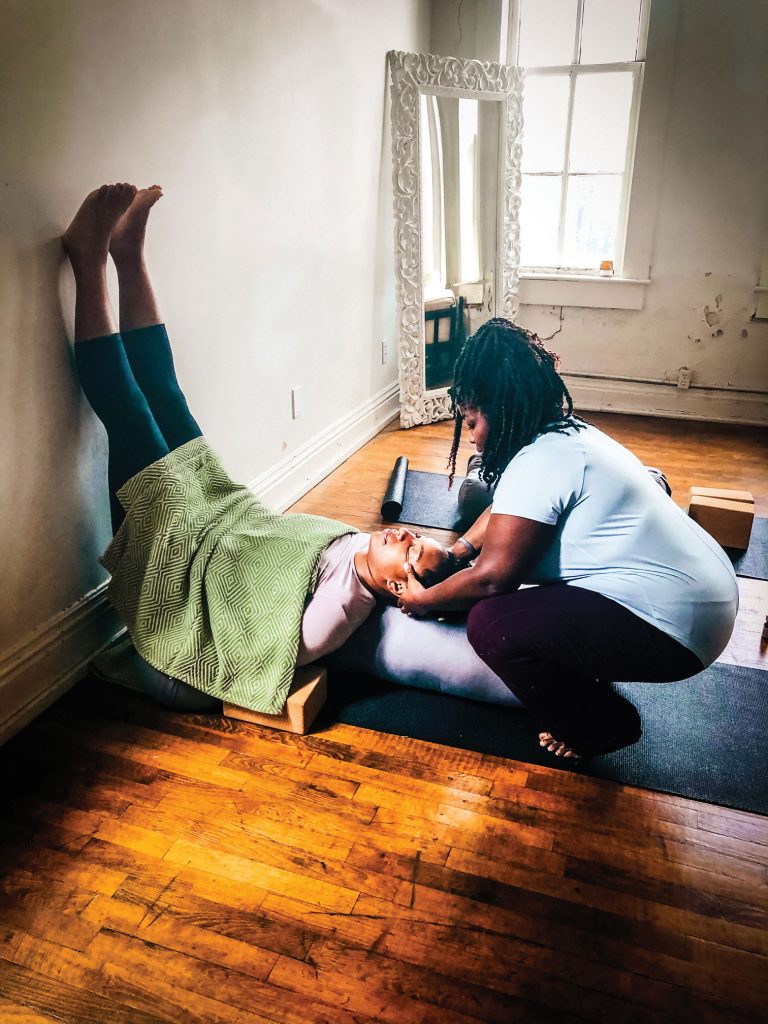
La-Shonda Spencer: Seeing “the most joyous time”
“Relax and breathe, breathe into the baby’s home,” says BirthWell doula La-Shonda Spencer, of Vestavia, cradling the head of a pregnant client in a resting yoga pose.
Later, she explains: “I did that so when she feels restless from work, she can put her legs up on the wall. It helps lower blood pressure, reduces swelling in the feet, and increases blood flow to the whole body… She’s also stressed from the pandemic. She doesn’t know if she is going to be OK, if her baby is going to be OK. Having a baby during a pandemic is scary.”
Spencer remembers one client with no family around except two small children. “Her baby came early the first time, and she wanted to avoid that this time. I went to her house, and we practiced techniques like breathing through contractions, doing yoga at home, and learning to meditate with the kids. Even something as simple as giving yourself permission to lay down, in a reclined butterfly position, and put your hands on your baby (belly) to center yourself can improve body awareness and reduce stress.”
That client’s baby came on time (39 weeks) and quickly (8 hours of labor) with Spencer there coaching her client every step of the way. “It’s amazing to have a job where you see women at one of the most joyous times in their lives,” she says, smiling.
After a year of attending many births “virtually” because of COVID-19 restrictions in hospitals, Spencer is happy to be back to in-person doula services and making yoga accessible to anyone, including expectant parents who take her pre-natal yoga classes.
”It’s a lifelong dream, my current work,” Spencer says, adding that she had once wanted to be and OB/GYN doctor, then tried social work before starting her full-time business, Gracious Beginnings Doula and Wellness at https://www.graciouswellnessbyshonda.com/
She finds that doula and yoga services marry perfectly for the Birmingham area families that she serves.
“A client will come to me and say her OB advises yoga for symptoms like lower back pain, tight hips, and mental stress. But the client has never done yoga before, or she doesn’t know what’s best now that she is pregnant. She may also want to involve her partner, and I enjoy working with the entire family.”
What do BirthWell clients say?
“A doula is not an accessory to your professional team. She is a necessary member,” says BirthWell client Amanda Harden, of Birmingham, who had her second son with BirthWell doula Leah Hayes. “It’s time to give doulas a permanent place in the birthing suites.”
With her first son, an unplanned Caesarean section (after 33 hours of labor) prompted Harden to take steps to plan for a vaginal birth the next time, including seeing a chiropractor and a pelvic floor physical therapist to get her body ready for her second son.
“That took care of the physical aspect of preparation. But I needed help with the emotional component. I really needed to be able to look at a doula who could tell me, ‘You can do this!’ I also wanted to take the pressure off of my husband and my mother. I didn’t want them to try to be experts at a VBAC (vaginal birth after Caesarean); I wanted them to be who they are.”
But she and her husband had just moved to Birmingham, and they were not in a financial position to hire a doula who specializes in VBAC (the cost in Birmingham usually starts around $800). When Harden consulted her physician, she mentioned BirthWell as a non-profit with highly trained doulas and special rates for families in need.
“It is an amazing benefit from the generosity of others,” Harden says. “When I called and asked if they had someone experienced in VBAC, they said yes. As soon as I met my doula Leah Hayes, who had had a VBAC herself, I knew I was going to be relaxed and confident with her.”
Harden had her second son vaginally in March 2020, a week before the COVID pandemic hit. She was in hard labor only five hours and required no medication, in contrast with her first child’s birth. “That meant I was able to see him, hold him, and bond with him right away, breastfeeding him within an hour. We were at such peace with this baby.”
Harden’s active sons, ages 3 and 1, can be heard in the background over the phone as well as her husband, Marcus, who shouts: “Leah was awesome!” Harden says her mother was also grateful for the BirthWell doula. “She did not feel the least bit threatened or replaced. I encourage other moms in need to call BirthWell. Every mom deserves to have a doula in her court.”
If a doula were a drug
“If a doula were a drug, it would be unethical not to use it,” said the late pediatrician, researcher and international doula educator, Dr. John Kennell. And if any state should heed that wisdom, it’s Alabama.
A recent federal report on maternal mortality cited Alabama for the third highest death rate of mothers in the nation in 2018. At 36.4 mothers lost per 100,000 live births, maternal mortality remains statistically uncommon; yet Alabama’s ratio was more than twice the national level (and the U.S. ranked last among wealthy countries, behind Russia.)
What’s more, researchers fear maternal “near miss” rates are many times higher, and studies show “African American women are three to four times more likely to die from pregnancy related causes when compared to white women.” Tragically, in 2020, a state report said 70% of Alabama’s maternal deaths studied were preventable.
As BirthWell celebrates its 10th Anniversary this year, it remains dedicated to creating new and healthy birth options for families having babies in the Birmingham area, says co-founder Petrus, who is a DONA Certified Birth Doula and a Lamaze Certified Childbirth Educator.
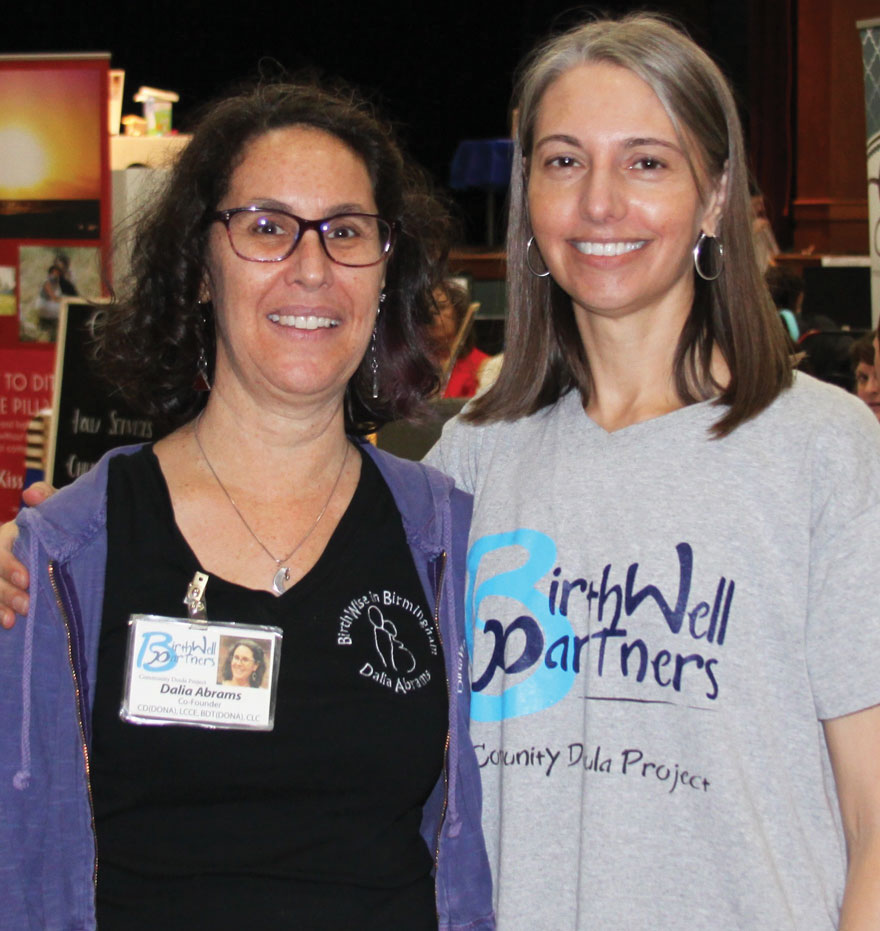
To that end, BirthWell has developed a diverse and dedicated pool of birth doulas in the Birmingham area where there once were almost none. Since its founding, the organization has held 24 birth doula workshops, trained 315 people, 88 of whom were on a “work-study program” designed to eliminate cost barriers to doula training. Additionally, 99 trainees were people of color, five were Hispanic, and 20 were labor and birth nurses
“We now serve over 100 pregnant individuals and their families each year. We probably coordinate 40 to 50 doulas who work with us on and off,” says Petrus. “Thanks to the growth in the doula profession locally, I think there is greater awareness of what doulas do and don’t do. People are also more aware of the rights of birth givers, whether it’s the right to change providers on Medicaid, to say ‘yes’ or ‘no’ to a procedure, to privacy, to speaking up and asking questions about what’s important to you. Maybe you don’t have to wear a hospital gown to give birth.”
As a professional doula, Petrus has assisted more than 75 births herself. She stresses the benefits of doulas to the birth team, not just the birth giver.
“As a doula, I provide support for the whole birth team, not just the pregnant person,” she explains. “By being observant, reading what’s going on with medical professionals in the room, I can improve communication and help everyone stay calm. I help others on the team — a partner, a mom, a nurse – be more effective.”
For example, when a woman in labor is no longer able to advocate for herself, a doula can coach a husband or partner to be her voice about her birth plan, she adds. If emergency surgery is needed, a doula can explain to family members what to expect. “An unplanned Caesarian section can be scary, and often, the nurses don’t have the time to tell everyone exactly what’s happening.”
As BirthWell enters its second decade, the small non-profit’s big idea is to embed a trained doula in every community so that a self-sustaining birth support professional can serve friends, neighbors, and other people who live in and around the neighborhood
That brings co-founder Abrams back to her original question: ‘What would the world look like if every woman who has a baby thinks she can do great things?’”
Thanks to these two pioneering women, and missionary doulas like Leah Hayes, Rachel Casiday Bailey, and La-Shonda Spencer, Birmingham is on its way to finding out.
Editor’s note: Jennifer L. Greer is a freelance journalist and retired instructor/assistant professor, University of Alabama at Birmingham (UAB). She volunteers for BirthWell Partners. Visit BirthWell Partners Community Doula Project or search #10yearsofBirthWell on social media to learn more about BirthWell Partners and to make a donation in support of better birth in Birmingham and Central Alabama. Doula Leah J. Hayes can be reached at bpositivehes@gmail.com.

